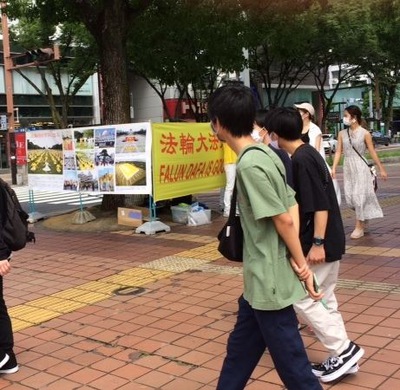(Minghui.org) Falun Gong practitioners held activities in Sakae, the busiest business area in Nagoya on June 21, 2020. They set up large banners and posters and demonstrated the exercises.
 Practitioners held activities to introduce Falun Gong in Nagoya's busiest district, Sakae, on June 21, 2020.
Practitioners held activities to introduce Falun Gong in Nagoya's busiest district, Sakae, on June 21, 2020.
Due to the coronavirus pandemic, Japan implemented a stay-at-home policy until the end of May. More people are now coming out with face masks.
Practitioners demonstrated the exercises and put up large informational banners and posters. Attracted by the soothing music, many passersby stopped to watch the demonstration and read the posters.
Background
Falun Gong was first taught to the public in 1992. Nearly 100 million people across China were soon practicing Falun Gong after experiencing improvements in their health and character. Jiang Zemin, former head of the Chinese Communist Party (CCP), perceived the spiritual discipline's growing popularity as a threat to the CCP's atheistic ideology and issued an order to ban Falun Gong on July 20, 1999.
Minghui.org has confirmed the deaths of thousands of Falun Gong practitioners as a direct result of the persecution over the past 22 years; the actual number is suspected to be much higher. More have been imprisoned and tortured for their faith.
There is concrete evidence that the CCP sanctions the harvesting of organs from detained practitioners, who are murdered to supply the organ transplant industry.
Under Jiang's personal direction, the CCP established the 610 Office, an extralegal security organization with the power to override the police and judicial systems and whose sole function is to carry out the persecution of Falun Gong.
Facing the brutal persecution, Falun Gong practitioners raise awareness of the persecution and spread the grace of the spiritual practice.
All content published on this website is copyrighted by Minghui.org. Minghui will produce compilations of its online content regularly and on special occasions.










